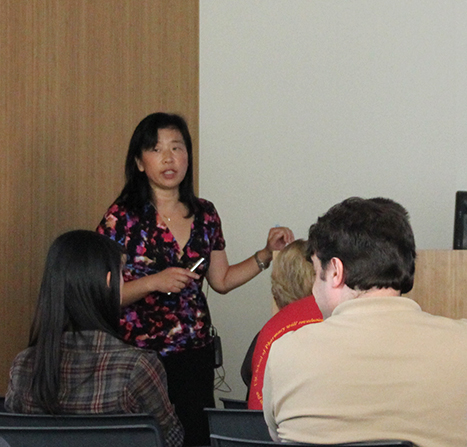
Only five percent of potential cancer drugs make it from phase I clinical trail to FDA approval, but J. Jean Cui, PhD, associate research fellow at Pfizer, beat the odds.
Cui visited the Eli and Edythe Broad CIRM Center for Regenerative Medicine and Stem Cell Research on Friday, September 13, to share her perspective on drug discovery with students as part of the Careers in Science seminar series, presented by the center in conjunction with the USC School of Pharmacy and the USC Center for Excellence in Research.
To give the students an understanding of what it takes to develop a cancer treatment, Cui told the story of the cancer therapeutic Xalkori. A 17-year veteran of the pharmaceutical industry, she was the project leader for the team that developed this drug, which treats a rare form of lung cancer.
Cui and her team increased their chance of success by using structural chemistry rather than standard trial-and-error to construct small molecules that would specifically inhibit c-Met, a protein thought to be involved in multiple types of cancer. In order for a drug to be effective, it would have to interact only with c-Met and not with similarly-structured proteins — such interaction could have toxic side effects.
After 1.5 years of testing different molecules, Cui’s team identified what would become Xalkori, which targets c-Met as well as a protein called anaplastic lymphoma kinase (ALK). This proves highly effective in killing the lung tumor cells.
Due to its high efficacy, Pfizer received an accelerated approval from the FDA to market Xalkori to lung cancer patients with the fused genes. On average, it takes somewhere between six to 11 years for the FDA to approve a drug after Phase I clinical trial. For Xalkori, it took only four years.
Cui and her team’s unique approach not only paid off, but also became a model for others in the industry.
Cui attributes her success to teamwork. “Drug discovery is such an integrated team effort,” she said. The ability to speak the language of other disciplines is another skill essential to her team’s success.
The students in the audience appreciated Cui’s story. “I liked getting her perspective since she saw the whole process from bench to bedside,” said Christine Solinsky, a PhD student in the clinical and experimental therapeutics program at the USC School of Pharmacy.
Perhaps one of the students who heard Cui speak will innovate the next novel approach in drug discovery.
